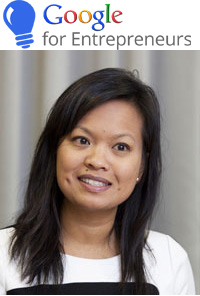- California Assembly OKs highest minimum wage in nation
- S. Korea unveils first graphic cigarette warnings
- US joins with South Korea, Japan in bid to deter North Korea
- LPGA golfer Chun In-gee finally back in action
- S. Korea won’t be top seed in final World Cup qualification round
- US men’s soccer misses 2nd straight Olympics
- US back on track in qualifying with 4-0 win over Guatemala
- High-intensity workout injuries spawn cottage industry
- CDC expands range of Zika mosquitoes into parts of Northeast
- Who knew? ‘The Walking Dead’ is helping families connect
Google to support entrepreneurs
By Kim Yoo-chul
Google will step up efforts to encourage Korean entrepreneurs to develop and own intellectual properties (IPs) via its highly-organized support programs, the U.S.-based search giant said Wednesday.
A senior Google executive said it’s in the process of expanding its ongoing support programs for entrepreneurs in Korea in accordance with its initiative to grow diversity in the technology sectors and with entrepreneurs.
“Google has no intention to stockpile IPs or acquire classified info via our entrepreneur programs. These programs aren’t about sourcing ideas. Rather, it’s more about moving forward in highly organized ways,” said Mary Grove, head of Google’s Global Entreprenuership Outreach, in a meeting with reporters at the headquarters of Google Korea in Seoul.
“For example, if a local startup plans to make something based on our Android software, we can offer our APIs based within our cloud-computing framework. Be more transformative and create, then we will support,” Grove said.
Google operates programs to support entrepreneurs by providing financial sponsorships, networking events, workshops and well-organized training sessions. Google is also providing discounts to startups on premium versions of Google products like Maps API.
In discussing the rising popularity of its entrepreneur programs, the executive said the California-headquartered outfit is teaming up with a number of governments including Seoul to lower barriers for startups to enter the mainstream and succeed.
“Governments could form venture funds and provide sources to local economies,” Grove said.
Google’s “Global K-Startup,” which is a competition to extend opportunities to startups in Korea, has received 428 applications, and 35 teams were selected this year, which is a rapid increase from the previous year.
The executive stressed Google is encouraging local startups to go global with competitive products after they first succeed in Korea.
Seoul is providing some $3 billion in funding for startup companies, which is a part of President Park Geun-hye’s plan to nurture more innovative industries.
Grove said building communities is one of the core tenets of the company’s primary mission, as she believes Google is able to accelerate diversity in entrepreneurship.
“That’s why we are interested in supporting more in places where communities can gather. Personally, I would love to see growth for the ‘Campus for Women’ center, which offers customized services to ‘working moms.’ We are definitely exploring opportunities for other partners,” Grove said.
The executive said Google is a company founded by entrepreneurs and adores entrepreneurship. By expanding the support programs, she said Google is gaining insight from a global perspective.
Grove, who earned her bachelor’s and master’s degrees at Stanford University, explained that the firm has five criteria ㅡ global access from anywhere; physical communities matter; great products win; diverse companies thrive and entrepreneurs are 10X doers.
“It’s not just about the venture capital. ‘Crowdsource funding,’ community, mentorship, a great product and company; the rest will follow. Perspective and teams lead to better outcomes, and diversity can’t happen in a silo. Entrepreneurship is a vehicle of freedom, development, expression and advancement,” the executive stressed.
Its “Campus London,” for example, is a seven-story building filled with startups. Grove explained that is the company’s gift to the tech community in London, though she declined to comment on whether or not Korea will see a “Campus Seoul.”
















